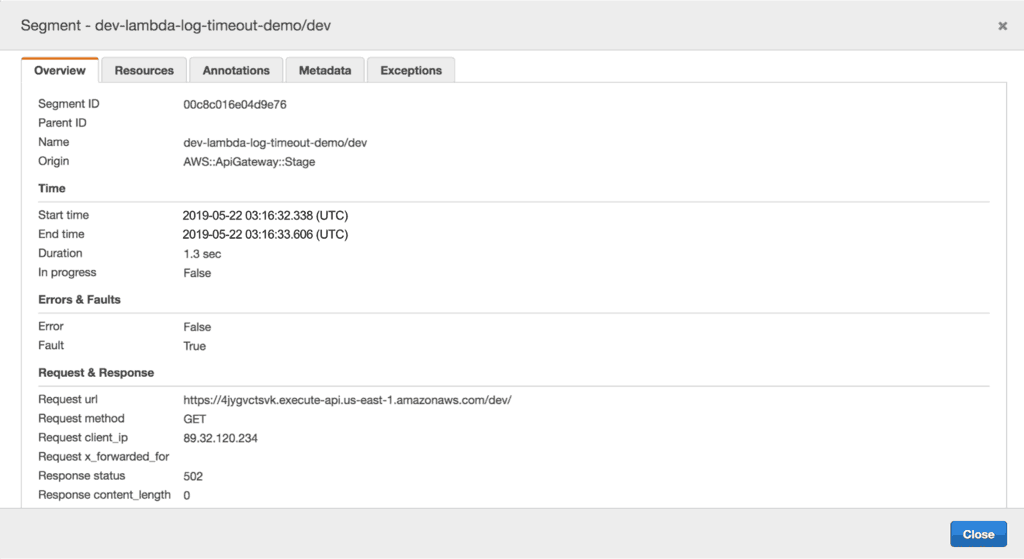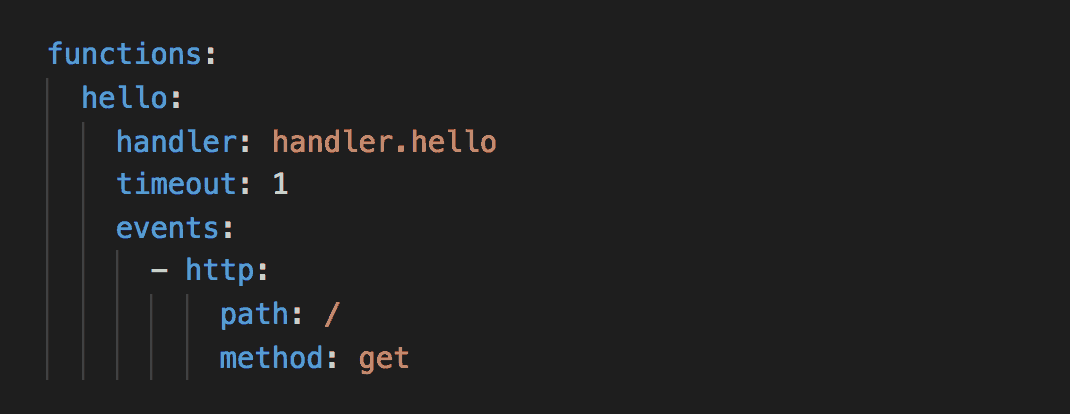
Yan Cui
I help clients go faster for less using serverless technologies.
This article is brought to you by

The real-time data platform that empowers developers to build innovative products faster and more reliably than ever before.
Imagine the situation. It’s 3 AM, and PagerDuty alerts you that the number of 5XX errors has spiked. Something’s wrong.
Strange, there are no error logs…
Fortunately, we have enabled X-Ray tracing and I’m able to quickly find one of the traces for these 5XX errors.


Sadly, the traces don’t offer any explanation for the error.
After fumbling around aimlessly for a while for clues, a moment of genius struck. I just so happens to notice the function’s timeout value is set to 1 second. The Duration from the trace was 1.3 seconds.

Aha, the Lambda function probably timed out! Now that I have a suspected cause, I’m able to get the confirmation by looking for "Task timed out" messages in the logs. And sure enough, I’m able to find them.

And now I can start the real investigation into what happened and find out what caused the function to time out.
This would have been much easier if only I had an error log message that informs me about these time outs!
If all this sounded awful, then you’re in luck. Today, we’re gonna see how we can log an error message when a Lambda function times out.
Pre-emptively log timeout messages
Hold on to your hats, because the solution is mind-bogglingly simple! All you have to do is to log the error message just before the invocation times out ;-)
The context object for a Node.js function has a very useful method called getRemainingTimeInMillis. It returns the number of milliseconds left in the current invocation. So, we can schedule a callback to be actioned JUST before the function times out and preemptively logs the timeout event.
Sure, you might get the odd false positives in the logs. But that is still a lot better than not having any error logs when the function does time out!
This is a cross-cutting concern that should be encapsulated into a middleware. If you’re using Node.js then you should consider using the middy middleware engine. Here, I can write a very simple middleware to log timeout errors:
const Promise = require('bluebird')
const Log = require('@perform/lambda-powertools-logger')
module.exports = () => {
let isTimedOut = undefined
let promise = undefined
const resetPromise = () => {
if (promise) {
promise.cancel()
promise = undefined
}
}
return {
before: (handler, next) => {
const timeLeft = handler.context.getRemainingTimeInMillis()
handler.context.callbackWaitsForEmptyEventLoop = false
isTimedOut = undefined
promise = Promise.delay(timeLeft - 10).then(() => {
if (isTimedOut !== false) {
const awsRequestId = handler.context.awsRequestId
const invocationEvent = JSON.stringify(handler.event)
Log.error('invocation timed out', { awsRequestId, invocationEvent })
}
})
next()
},
after: (handler, next) => {
isTimedOut = false
resetPromise()
next()
},
onError: (handler, next) => {
isTimedOut = false
resetPromise()
next(handler.error)
}
}
}
Couple of things to note about this code:
ln21: we schedule a callback to be executed 10ms before the function times out.ln33/ln38: if the function completes before the scheduled callback runs then we will cancel the callback using bluebird’s Promise.cancel.ln18: this is important. If you don’t setcallbackWaitsForEmptyEventLoopto false then the invocation won’t complete until the callback has executed. That would make every invocation last longer!ln24: capture the invocation event when the function times out. This is useful for replaying the invocation locally to debug the problem.ln2: we are using the logger from dazn-lambda-powertools so it’ll automatically populate any captured correlation IDs in the logs. For more details, check the README in the repo.
If you want to see this middleware in action then take a look at this demo project. Once deployed, I can curl the HTTP endpoint and see an error message for timeouts.

So that’s it! The approach is really simple.
To make it really easy for you to apply this to your projects, we have added this middleware to dazn-lambda-powertools so you will be able to use it via NPM.
Whenever you’re ready, here are 4 ways I can help you:
- Production-Ready Serverless: Join 20+ AWS Heroes & Community Builders and 1000+ other students in levelling up your serverless game. This is your one-stop shop for quickly levelling up your serverless skills.
- Do you want to know how to test serverless architectures with a fast dev & test loop? Check out my latest course, Testing Serverless Architectures and learn the smart way to test serverless.
- I help clients launch product ideas, improve their development processes and upskill their teams. If you’d like to work together, then let’s get in touch.
- Join my community on Discord, ask questions, and join the discussion on all things AWS and Serverless.